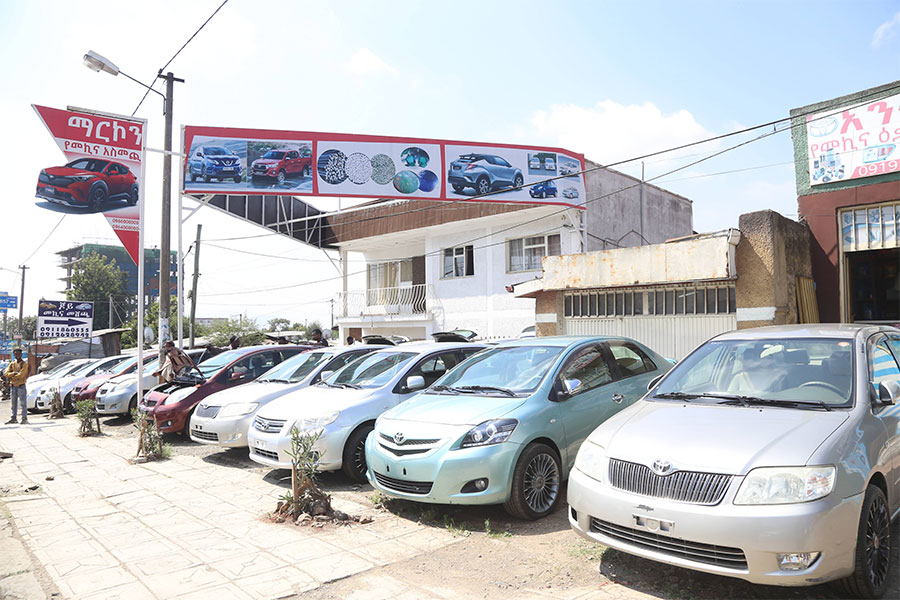
Radar | Aug 21,2023
Mar 6 , 2021
By FASIKA TADESSE ( FORTUNE STAFF WRITER )
The Public Procurement & Property Disposal Service has started identifying used vehicles from public offices that will be disposed of as scrap metal. Previously, old vehicles were either transferred to buyers for further use through auction or were abandoned altogether.
However, the technical document prepared by the Federal Transport Authority and approved by the Ministry of Finance in January enables the Service to identify which vehicles are to be auctioned off as scrap.
The new criterion has four requirements that outline which vehicles should be scrapped. Vehicles whose chassis are seriously damaged; old cars that served for 40 years or more and recently went out of use; cars with right-hand drive; and vehicles that have sustained over 60pc damage will be disposed of as scrap metal through auction.
The new scheme, initiated following the proposal from the Service, aims at protecting the environment from pollution and reducing traffic accidents caused by old cars, according to Tsewaye Muluneh, director-general at the Service; the only public office that has a mandate of disposing of vehicles.
The government has been devising laws to discourage the import and sale of used cars and has enacted an excise tax law, which imposes a hefty tax on used cars. The law levies a 105pc excise tax on cars aged two to four years and a 405pc tax on cars over seven years of age.
“It also aims at fulfilling the demand for scrap metal for industries,” said Tsewaye, who mentioned that a lack of clear laws was an impediment to her office's management of the disposal of these cars when it received requests from the public offices.
Data from the Public Procurement & Property Administration Agency shows that at least 10,000 vehicles owned by public institutions and universities have been mismanaged and were kept with no purpose.
As of the beginning of February, the Service has dispatched a circular to all public offices under its jurisdiction to send the list of old vehicles they wish to scrap. The new process will be initiated at 86 institutions that have been applying for vehicle disposal since 2015. Out of the total, 17 of them are located outside of the capital.
For the process of identifying and categorising the vehicles, the Service has hired four automotive experts. The process is expected to be finalised by May in two rounds.
"We want the public offices to get ready and wait for us," said Tsewaye.
After the categorisation is completed, the list will be sent to the Ministry of Finance for approval, according to Shunka Adugna, director of property valuation & disposal at the Service.
After the Ministry's approval, the Service will jump into floating a tender to sell the items for scrap metal. In the meantime, the Public Procurement & Property Administration Agency, the regulatory body, and the Central Statistical Agency will work on the pricing manual for the auctioning process.
The Palace Administration, the National Meteorology Institute of Ethiopia, the National Disaster & Risk Management Commission, the Ethiopian Biodiversity Institute and the National Lottery Administration are among the public offices that applied for the disposal of used vehicles.
Though the offices requested the vehicles' disposal, the Service has been facing challenges as the properties do not have necessary documents such as declarations.
After the full data and information are collected and the categorisation has been made, the government will decide how to handle the disposal of vehicles with no documentation, according to Tsewaye.
As a nation, the country does not have a culture of scrapping old and used vehicles, according to Andualem Mekonnen (PhD), a lecturer at the Centre for Environmental Science at Addis Abeba University.
"Despite their problems, old cars that are thrown away here will be reused somewhere else," he said. "It's good that the government moves toward disposing of old vehicles."
The regulatory agency has also kicked off a national movement to register the information of all idle properties on the premises of public offices. Active for five days as of April 13, the initiative will be led by the main committee formed with representatives from the public offices.
"With the process, we'll filter properties that are usable or not," said Haji Ibsa, director general at the Agency. "And we'll clear the backlogged items that need to be disposed of."
The Agency has addressed half of the over 180 public institutions to prepare the list of disposable items and the remaining will be reached through a media campaign, according to him.
PUBLISHED ON
Mar 06,2021 [ VOL
21 , NO
1088]

Radar | Aug 21,2023

Radar | Mar 26,2022

Fortune News | Dec 17,2022

Fortune News | Jun 20,2020

Radar | Jun 08,2019

Fortune News | Apr 22,2022

Radar | Dec 04,2021

Radar | Mar 18,2023

Radar | Mar 28,2020

Radar | Jun 12,2021

Dec 22 , 2024 . By TIZITA SHEWAFERAW
Charged with transforming colossal state-owned enterprises into modern and competitiv...

Aug 18 , 2024 . By AKSAH ITALO
Although predictable Yonas Zerihun's job in the ride-hailing service is not immune to...

Jul 28 , 2024 . By TIZITA SHEWAFERAW
Unhabitual, perhaps too many, Samuel Gebreyohannes, 38, used to occasionally enjoy a couple of beers at breakfast. However, he recently swit...

Jul 13 , 2024 . By AKSAH ITALO
Investors who rely on tractors, trucks, and field vehicles for commuting, transporting commodities, and f...

Oct 18 , 2025
The political establishment, notably the ruling party and its top brass, has become p...

Oct 11 , 2025
Ladislas Farago, a roving Associated Press (AP) correspondent, arrived in Ethiopia in...

Oct 4 , 2025
Eyob Tekalegn (PhD) had been in the Governor's chair for only weeks when, on Septembe...

Sep 27 , 2025
Four years into an experiment with “shock therapy” in education, the national moo...